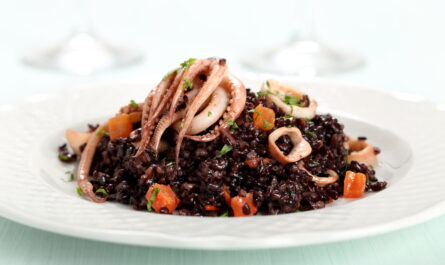When it comes to choosing between black rice and white rice, many factors come into play, including taste, texture, and nutritional content. For sushi lovers and health enthusiasts alike, understanding the caloric difference between these two types of rice can significantly influence dietary choices. In this article, we will explore the calories and nutritional benefits of both black rice and white rice, helping you make an informed decision for your next meal.

The Basics of Rice Varieties
Rice is a staple food for more than half of the world’s population. It comes in various colors, shapes, and sizes, each with its unique taste and nutritional profile. Among these, white rice and black rice are two of the most popular varieties. While white rice is processed and polished, resulting in a lighter color and softer texture, black rice retains its outer bran layer, giving it a distinctive dark hue and a chewy texture.
Caloric Content: Black Rice vs White Rice
Calories in Black Rice
Black rice, also known as forbidden rice, is rich in nutrients and has a slightly higher caloric content compared to white rice. A typical serving of cooked black rice (about 100 grams) contains approximately 335 calories. This variety of rice is packed with antioxidants, fiber, and essential minerals, making it a nutritious choice for those looking to maintain a balanced diet.
Calories in White Rice
On the other hand, white rice is more commonly consumed and has a lower caloric content. A similar serving size of cooked white rice contains around 204 calories. While it may have fewer calories, white rice lacks the fiber and micronutrients present in black rice due to the polishing process it undergoes.
Nutritional Comparison
Vitamins and Minerals
In terms of vitamins and minerals, black rice is a powerhouse. It contains higher levels of vitamin E, iron, and antioxidants compared to white rice. These nutrients are crucial for maintaining a healthy immune system and preventing chronic diseases. For more information on the vitamin content of black rice, visit this link.
Fiber Content
Fiber is another significant factor that sets black rice apart from white rice. With approximately 2 grams of fiber per 100 grams, black rice helps improve digestion and keeps you feeling fuller for longer. In contrast, white rice offers less than 1 gram of fiber per serving, which might not be as beneficial for those seeking to manage their weight.
Health Benefits of Black Rice
Beyond its caloric and nutritional content, black rice offers numerous health benefits. It is known for its anti-inflammatory properties and its ability to lower cholesterol levels. Additionally, it can be a valuable addition to a heart-healthy diet, as outlined in this external resource. Sushi lovers can also enjoy the rich taste and texture of black rice in their favorite dishes.
Drawbacks of White Rice
While white rice is a staple in many cuisines, it has some nutritional drawbacks. The processing it undergoes removes much of its natural nutrients, leaving it with a higher glycemic index. This means it can cause a rapid spike in blood sugar levels, which might not be ideal for those with diabetes or insulin resistance.
Incorporating Black Rice into Your Diet
For those interested in incorporating black rice into their diet, there are numerous delicious recipes to try. Whether you’re preparing a hearty bowl of black rice and beans or experimenting with sushi recipes, the possibilities are endless. Explore more here.
Allergies and Dietary Considerations
Before making any dietary changes, it’s essential to consider potential allergies. While rare, some individuals might experience allergic reactions to black rice. For a deeper understanding of this topic, check out this resource.
Conclusion: Making the Right Choice
In conclusion, when comparing black rice vs white rice calories, it’s clear that black rice offers a more nutrient-dense option with slightly higher calories. Its rich fiber content, vitamins, and minerals make it a superior choice for those seeking to enhance their diet with wholesome grains. Whether you’re a sushi lover or simply looking to make healthier meal choices, incorporating black rice can provide the nutrition and flavor you desire.

FAQs
Is black rice suitable for intermittent fasting?
Yes, black rice can be an excellent addition to an intermittent fasting regimen due to its high fiber content and nutrient density. For more tips, visit this link.
Can you eat black rice raw?
It is not recommended to eat black rice raw as it can be difficult to digest. Cooking it thoroughly ensures that you enjoy its full nutritional benefits. Learn more here.
Which rice is best for weight loss?
Black rice is generally considered a better choice for weight loss due to its higher fiber content, which can help with satiety and digestion.
This article contains affiliate links. We may earn a commission at no extra cost to you.




